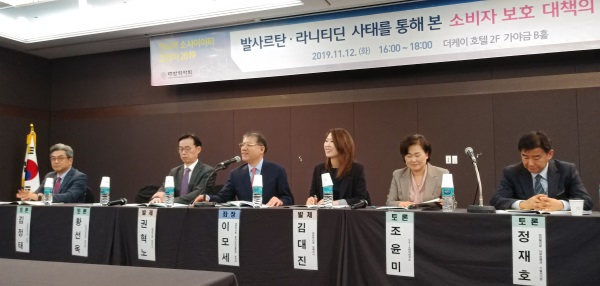“The results of ranitidine’s recall were sharply different from those of valsartan. These differences showed that consumers should know their drugs well to ensure safe recall of risky medicines. Trade names of medicines with expired patents must indicate internationally used names of ingredients.”

Kim Dae-jin, director for policy affairs at the Korean Pharmaceutical Association (KPA), made this and other points at a symposium on consumer protection, in light of the recall of valsartan and ranitidine, on Tuesday.
Explaining that there was a significant difference between the recall of valsartan and that of ranitidine, Kim said the future recall of harmful drugs should be voluntary rather than coerced by the administrative order.
According to Kim, while 90 percent of valsartan drugs were replaced with alternatives by hospitals and pharmacies, only 6 percent of ranitidine was replaced.
Because valsartan was a prescription drug for hypertension, hospitals and pharmacies were able to track the patients based on prescription records. However, as ranitidine was more widely prescribed, and some ranitidine drugs were sold as over-the-counter drugs, it was impossible to track all the people who took them, Kim explained.
“Korea has too many generic medicines compared to other countries. Even a pharmacist like me finds it hard to tell which ingredient the drug has, only by looking at the brand name. General consumers will have more difficulty,” Kim said. “We are not sure whether patients didn’t know they had to switch from ranitidine to other drugs or they knew it but thought that the harm was not serious enough, except for the 6 percent who changed their ranitidine with other drugs.”
The government ordered 175 items of valsartan to be recalled, and the recall was subject to 354,000 patients. In the case of ranitidine, 269 items had to be withdrawn from a whopping 1.44 million patients.
“As this case shows, consumers should be able to know what drugs they are taking for the safe management and prompt recall of risky drugs,” Kim emphasized.
According to Kim, consumers do not know well about their drugs because many doctors do not comply with the rule of issuing two sheets of prescriptions. Prescription papers and drug bags do not display the names of drug ingredients, there are too many generic drug times, doctors write too many prescriptions for unnecessary medicines, and pharmacists and consumers prefer individual packaging of drugs, Kim said.
To overcome these obstacles, generic drugs should indicate international names of ingredients, Kim argued.
A consumer group, which participated in the symposium, agreed with Kim.
C&I Consumer Research Institute President Cho Yun-mi said, “Physicians can prescribe drugs by ingredient names in Korea.”
As experts have called for a system to prescribe medicines by ingredient names for years, people should discuss why we have not been able to take action, she said.

